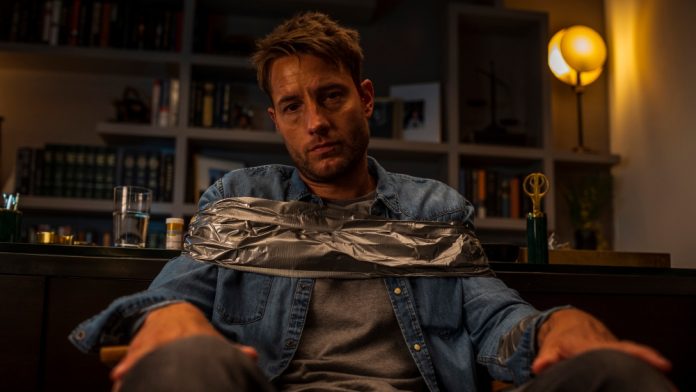Mo McRae is an established actor who makes his impressive feature directorial debut with the powerful and poignant indie film A Lot of Nothing, which he also wrote. Nominated for an NAACP Image Award for Outstanding Breakthrough Creative (Motion Picture), the title is a curious one to ponder, as there is actually a lot going on in the film — primarily between four characters whose lives intersect during an explosive but all-too-familiar scenario often witnessed on the evening news.
When a well-off married couple played by Y’lan Noel (also nominated for an NAACP Image Award for Outstanding Breakthrough Performance in a Motion Picture) and Cleopatra Coleman (Infinity Pool) discover their next-door neighbor (Justin Hartley, This Is Us) is the local cop accused of being involved in the shooting of a child of color, they decide to take matters into their own hands in a perhaps naive effort to “teach him how to get out of this generational cycle of hate.”
McRae has racked up numerous acting credits on TV shows including The Flight Attendant, Big Little Lies, Empire, Ray Donovan, and Sons of Anarchy, and he’s also been seen on the big screen in films such as Wild, Den of Thieves, The Butler, and The First Purge, the latter of which, incidentally, also starred his now-wife Lex Scott Davis. Davis also co-stars in A Lot of Nothing, as McRae wrote the part of Candy specifically for her.
As partners in life and business, they have a production company together, Scalable Content, through which they produced this film along with Inny Clemmons and David Oyelowo. McRae has also directed multiple episodes of All Rise, and he’s currently the producer/director of CBS’ gritty procedural crime drama East New York.
Above the Line recently spoke with Mo McRae via Zoom from the East New York production offices in Ridgewood, Brooklyn. Despite his staff occasionally heckling him and peering in on our conversation through the office window, he kept his cool. We talked about his personal inspiration for wanting to tell this story and how he hopes tackling subjects of race, class, and fear will resonate with audiences. McRae also revealed that he pays homage to several directors in the film, and explained how he used humor to lighten the darker scenes before hinting at the possibility of continuing the discussion in a sequel.
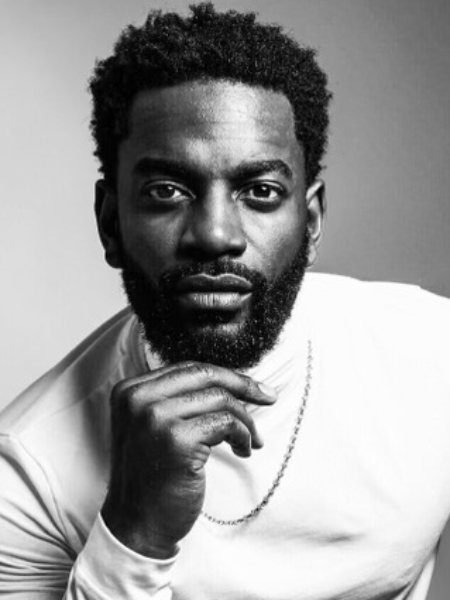
Above the Line: Let’s start with the inspiration for this story.
Mo McRae: The story was inspired by a lot of different things, primarily my own life and this profound need to kind of unpack and examine things that I have been thinking and feeling. Whether it was things I’d experienced or things I wondered what would happen if I did [them], and then kind of coupled with events that have been happening in the world, in our community, in America, and in society at large. All those things kind of floated around together until it just became a story that I had to tell. I had to find a way to bring all those things together into one cohesive work of art.
ATL: It’s interesting that you felt this sort of need to tell this story. Can you tell me why that was?
McRae: The need… I don’t know why it happened. I don’t think it was something I chose to have. I think my life would’ve been a lot easier had I not succumbed to that need. [laughs] But I really feel like it was rooted in this belief or this understanding that I had something to say that could be helpful for others, because it was helpful for me in the process of examining these things. So I felt like I had this need to be helpful in making an artistic contribution. I can move conversations forward. So I think when you move thoughts forward, then you move conversations forward, and actions will soon follow if done properly. And so I think that a lot of the “need” was rooted in that, as well as probably factoring in just my own need for relief with all these things I’ve been carrying and thinking about.
ATL: I understand that you grew up in a tough neighborhood with difficult surroundings, so how did that experience shape you as a storyteller?
McRae: The interesting thing about the challenging environment that I grew up in is that it shaped me, as does everyone’s environment in which they grow [up]. That is why they are referred to as your formative years — because they shape you into the person you will become as a result of the events that occurred during those times. The way it changed me is that I think it just made me aware of the perils in the world and things like danger and the importance of being perceptive. The importance of taking that second to reevaluate things, the importance of humanity, the importance of love and trust, honor and wisdom –all those things are important in this dangerous environment. The stakes were so high that those different virtues, qualities, and attributes really decided who got to live or not, or who got to live at a certain level or not. And I attribute all of that to where I grew up; although it was rough and challenging, I’m grateful for the person [and] the artist that it shaped me into.
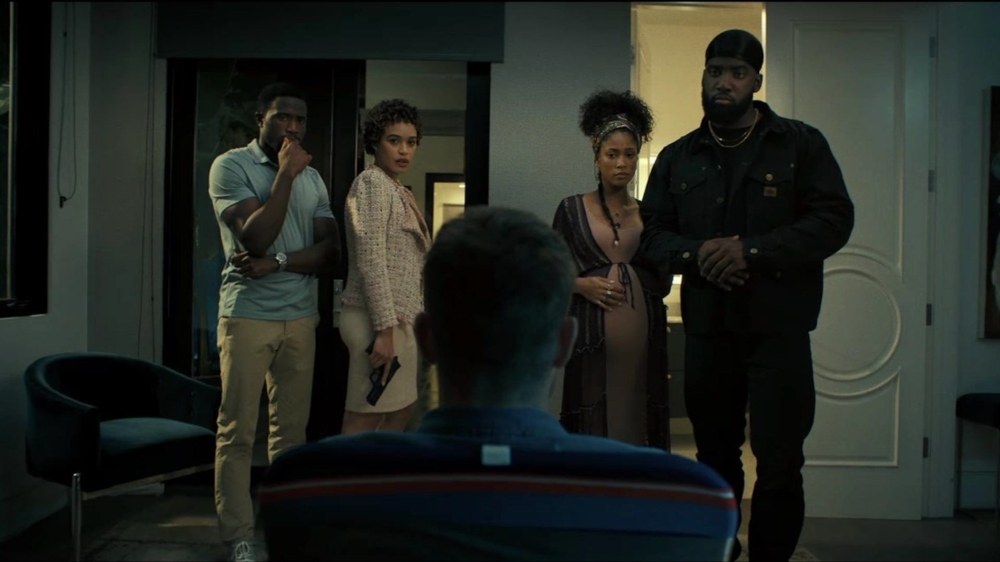
ATL: I feel like there’s enough social messaging to unpack in this film that A Lot of Nothing could be interesting to study in a film class.
McRae: Thank you for that. The tightrope walk with this film was that I didn’t want to create something that was didactic or heavy-handed or that was too politically motivated or anything like that. It was very much like, “Let’s just unpack as much as we possibly can and see where we end up and how we feel.” People talk about art being like a mirror for society, but this particular mirror was a funhouse mirror. It’s still a mirror, but it is distorted. It is not exactly as things are, but it’s not that far off. There are a lot of truthful elements in the absurdity of it all.
ATL: Can you explain to readers how you use dark comedy to lighten the mood during some of the film’s darker moments?
McRae: Well, without spoiling too much for people who haven’t seen it, I think just the preposterous nature of people getting so worked up, and it’s like, “What are we going to do? We’re gonna do something. Ooh, I’m mad! I’m upset! I’m gonna do a post!” That’s really funny to me. That is really hilarious. If you think about it, ‘OK, this thing happened, and I’m so upset about it [that] I’m going to grab my laptop and type everything I can think of as soon as I possibly can with the most perfectly constructed sentences to really showcase the depth of my lexicon.’ That is kind of absurd. Then it progresses to a character (Hartley) in a very compromising position with a chair strapped to their back, walking through the house that way. Just all these varying things that, although the subject matter is quite heavy and intense, there are these moments that allow us to laugh at the characters, and maybe, if we can be self-effacing, even laugh at ourselves as an audience.
ATL: You’re primarily known as an actor, so when did you decide that you wanted to try your hand at directing, and why was now the right time?
McRae: This is the first feature film I directed, but I had done a bunch of short films, pilot presentations, and commercials, so I made the decision to direct probably, I don’t know, over 10 years ago. I also do photography, so I had already been making images, and throughout my acting career, I had started writing for film, so I was already doing a lot of the individual elements I think are required to have a great understanding of directing. It just took me a while to build up the courage to begin to verbalize it because I have such respect for the craft and reverence for it that I didn’t want to just dive in and make a feature without really putting that due diligence into that effort. I’ve been extremely fortunate because of my acting career to shadow such incredible filmmakers and get the opportunity to also work with filmmakers [who] weren’t incredible and see what the pitfalls were and how to avoid them.
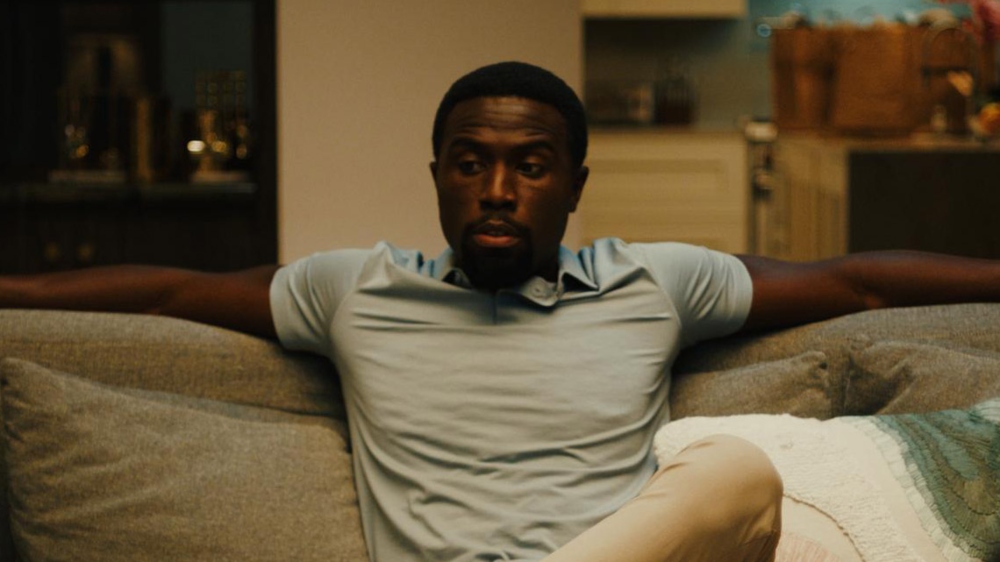
ATL: Speaking of shadowing directors, I noticed in your film that you have a few homages to some of the greats, including Spike Lee.
McRae: Yeah, Spike, for sure. A lot of these homages are quite unintentional and not until I’d seen the film at different stages of my own [did] I realize, like, “wow.” Someone brought this to my attention… when James (Noel) is in the bedroom, it was very Hitchcockian at times in the film. [And then] there’s the Paul Thomas Anderson-style opening. The opening of the film is very much something you could imagine Paul Thomas Anderson doing with that long single take with just the humor and the tension colliding, in a way. You don’t know if you wanna laugh or [if you] feel uncomfortable. But then [there are] Spike Lee turns [with] of some of the levity and the execution around the racial dynamics in the workplace and then the photography of it, and really pushing the imagery, and then the camera moves in very dynamic ways, [much] in the same way that Spike’s does.
ATL: Looking straight into the camera is very Spike Lee, which you had your characters in this film do a few times.
McRae: Right. He has those moments where it feels more like a portrait than a film, and that is something he does very well. And also there’s some Coen brothers in there with reverse shots — just very simple, composed things that just tell a story. There are a lot of really incredible filmmakers who have kind of unconsciously worked their way in there. In my heart, I want to believe that I am a keeper of the flame for the fires that have gone before me and that my approaches will inspire others. I brought so much of my own point of view and work into the piece, but that flame just continues to go.
ATL: Let’s talk about the casting, and let’s start with Y’lan Noel, who I believe was nominated for an NAACP Image Award along with the film itself, so congratulations on that.
McRae: Thank you. So [with] Y’lan, we had worked together on a film that we both acted in, [and] he was the lead in this film. One of the Purge movies was called The First Purge, even though it was like, the fifth Purge. I just found him to be incredibly dedicated, a true thespian, a true artist, and a gentleman. He and I really hit it off [during] that process. Initially, when I was making this film, I had someone else attached to play the lead, but that person fell through. Then I went through the audition process, and a lot of the usual names came up, and he had come to mind. I was like, ‘Well, I think he could pull this off.’
Because the material is so tricky, I think he didn’t fully understand the tone in his first audition, where the levity [was], but he understood the stakes. There was just something about him. I just couldn’t get him out of my mind, and me being the obsessively honest person that I am, I called him and told him. I said, ‘Hey, man, I thought your audition was really good, but it didn’t show me all the things I need to see. This is what this film is. This is what this character wants to be, so take this information and run it through your own filter.’ He came back in, and then it was electric; it was magic. And once I saw that he was the guy, he was the first person to get an offer on the film. He was my anchor [who] I built around. He’s the foundation of the casting at that point.
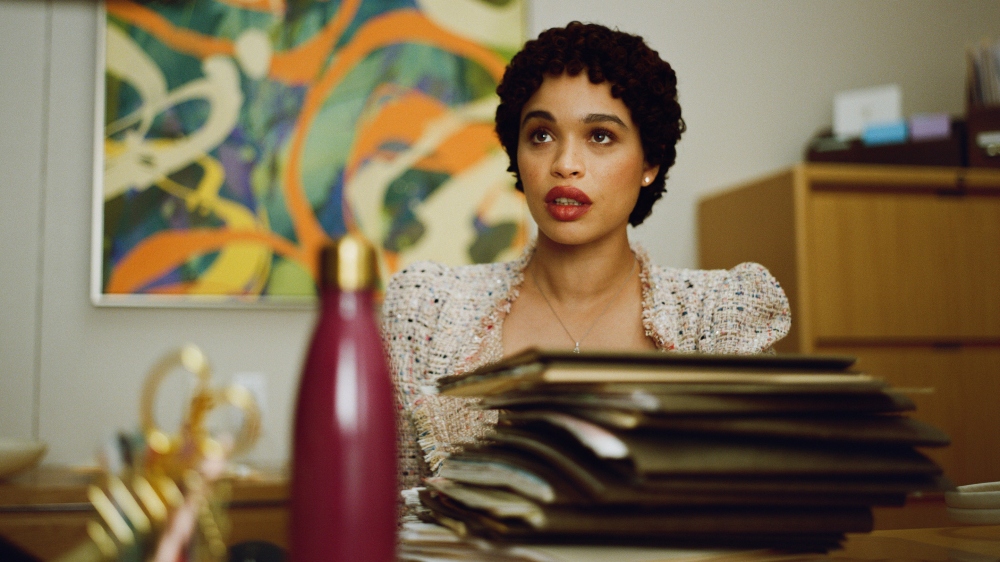
ATL: What about casting the role of his wife, Vanessa, who’s played by Cleopatra Coleman?
McRae: There were a lot of really incredible actresses [who] came in and auditioned for Vanessa, and the moment Cleopatra Coleman walked in, my first thought was, ‘Wow, I really want to photograph her.’ She has such a striking face. She’s gorgeous, and she’s unique. This is a weird thing to say, but there are conflicting features and energies in her face. There are things that are very soft and sweet, and other things are very rigid and austere. It all comes together in a really beautiful and striking way.
Then I wondered what her acting was going to be like, and she did it. She was the first person to get every single thing that I had hoped for with this character. I’ve never said this before, but oddly enough, it almost scared me a little bit because it was like, “Oh wow, this is going to be real.” I always knew it was going to be polarizing and crazy and all these things. The casting thing was like an excuse because I didn’t know if I would find the right people, but not anymore. I found the right person when I found her. We did a chemistry read and put those two [Coleman and Noel] together for the first time, and it was just electric.
ATL: Is there anyone else you’d attribute some of the casting choices to?
McRae: Throughout this time, I [was] working with my producing partner, Inny Clemons, and Leslie Woo, the amazing Casting Director [who] had just come off of doing The Farewell. My manager, Kim Hodgert at Anonymous Content, helped connect me with Leslie. I have so much respect for her for putting faith in me as this new filmmaker coming off of this huge moment. This is, like, the very next thing she did after that film, which was my movie. So I was honored to have them all to guide me through the process.
ATL: How did Justin Hartley find his way into the mix for the next-door neighbor cop, Brian? [As I wrote this, I discovered on IMDB that McRae had appeared on This Is Us.]
McRae: We had been thinking about all these guys, and the agents were like, ‘You’ve got to make a straight offer to this person or that person.’ A lot of these people are not going to want to audition; they’re not going to meet. This film means so much to me, and that Brian character, like all the characters in the film, is such a tightrope walker — there’s such a juxtaposition between the expectation of the character and the reality of the character — that I couldn’t just blindly offer it to someone, because there was never a character like this that I’d seen in anybody’s work.
So, Justin was gracious enough to meet and read with me, and we just really hit it off. We had in-depth conversations, and there’s some stuff that happened. We fell out to the point where we just lost contact, and we kind of started going down a road with someone else. But Justin never left my mind for the part, and then it came back around for it to work out timing-wise with Justin. He just embodies the character in such a beautiful way. I’m so excited for him, for people to see he’s more than just — yeah, he’s devastatingly handsome, but he’s so much more. There’s so much intelligence and depth and humanity and nuance and understanding, and he just got every part of it.
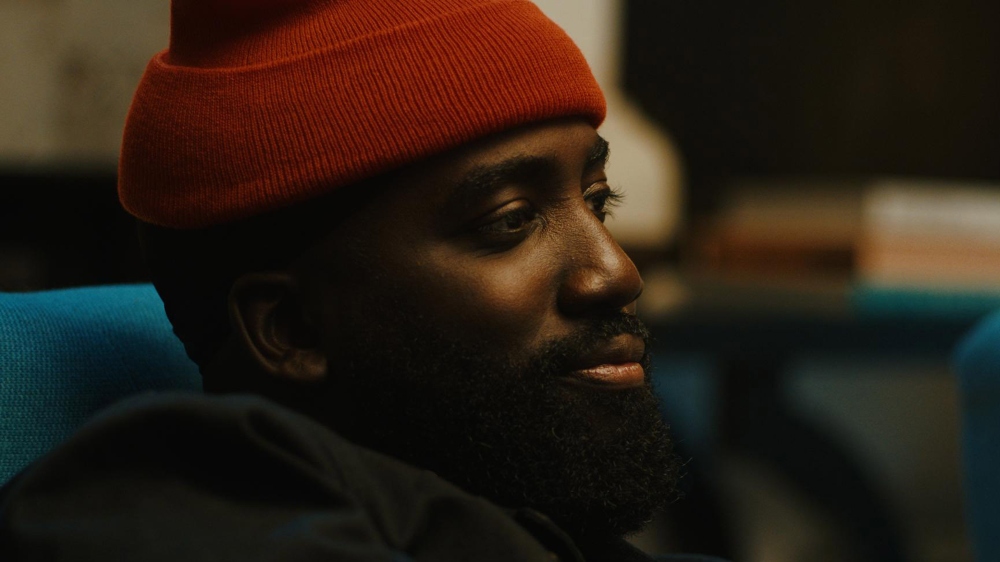
ATL: What about casting the brother and his very pregnant wife, who I think you knew quite well!
McRae: Shamier Anderson plays Jamal, and Lex Scott Davis plays Candy. Shamier is another person I knew. We had acted together, and the first time I met him, I knew he was a star. He has that thing where you feel his immense presence. He’s operating in a different league, and he just took the character and ran with it, making it his own. Lex Scott Davis is in my production company [Scalable Content], and she’s in my household company. She’s in my parental partner’s company. She’s in my marriage company. So, you know, that’s my wife. She’s the one person who is playing a role that was written specifically for them. She inspired the character. I wrote it for her. It was always her the whole time. Her life, her existence, was the audition. When I wrote it, we did not have kids yet. And crazy enough, while we were filming, she was actually pregnant. So just the synergy of the whole journey is quite remarkable.
ATL: What were the biggest directing challenges for you, especially since it was your first feature?
McRae: The difficulties of filming some of those scenes were heightened because my wife was actually pregnant. We had very limited time and resources, but a massive amount of ambition. So everything was very meticulously planned and scrutinized. I just really wanted to get it right because I knew so many people were giving me so much that I never wanted anyone to feel like I squandered what was provided by them in their efforts. Just the bar I had set for myself in terms of what I was aiming to do.
So all those things were difficult, but they were made not even just palatable or tolerable; they were made enjoyable by the collective genius that had come together around the project. My stunt coordinator [Rick Avery] was phenomenal. The actors, my DP [John Rosario], the production design [from Emma Rose Mead, Amy Lee Wheeler], the props [department] — everyone was just top tier, top-notch. Everything about it was 1,000 percent a dream job.
ATL: Where was the stunning house that you shot the film in?
McRae: The house was in Brentwood, which was the worst possible place to film because they did not want filming in their neighborhood next to all their other stunning houses. So it was a true pain in the ass to film in Brentwood. And I am an L.A. native. I love Los Angeles; I was born and raised in L.A., but I must say the people in Brentwood exhibited no grace toward me in my production. The things we had to endure while just trying to make a film and be as respectful to their inhabitants as we could be, which we always were, were quite unfortunate. But even with that, we came into a place that did not want us there. So I will not be making my next movie in Brentwood… or maybe I will!
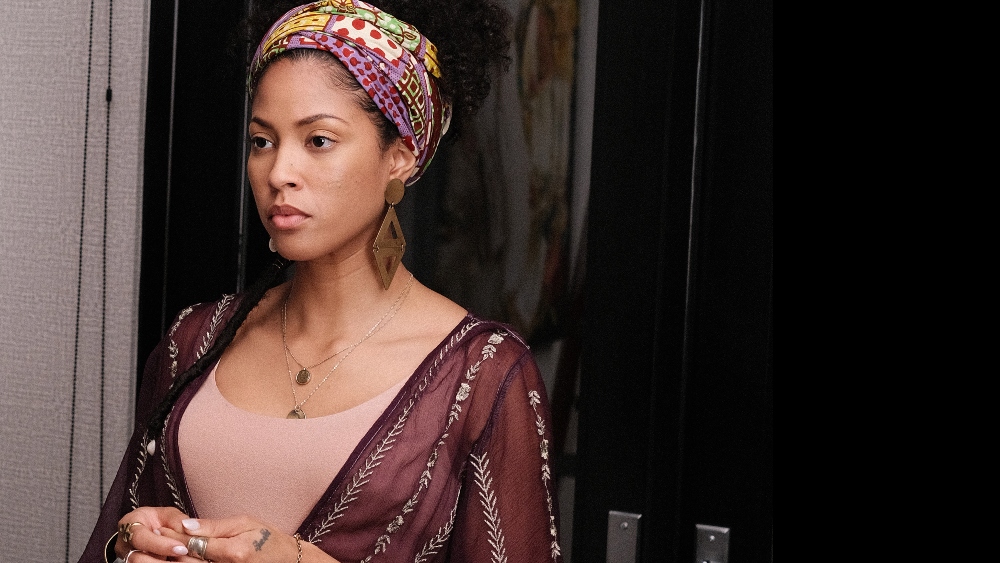
ATL: You mentioned earlier that this is a cautionary tale. What do you hope audiences learn from the film and see in its symbolism?
McRae: I think we can learn that honest communication is very important. Listening and getting all the facts before reacting is very important. I think having a proper perspective on what really matters is very important, and we should also learn that kidnapping your neighbors can also be very bad [laughs]. Don’t go kidnapping your neighbors!
I think images are powerful. As best as I could, I really tried to litter every frame with poetry, and I had something to say or something to ask in every frame. The idea of just conflicting elements colliding and what that represented at that juncture of the film, of the [scene where] the blood and the sage are together in the same space, after everything that had transpired, and what that represents. It’s similar to creating my own iconography for my first film and the things I want to do in the future that are evocative and unique that I haven’t seen before and are very relevant to the storytelling.
ATL: Is there another film that could come after this that could further tell the story?
McRae: [chuckles] Honestly, yes, because there’s so much up in the air here, right? So it’s like, “what actually happens from here?” And then the big thing is, “what was learned from everything that transpired?” That’s where my own curiosity lies. Even if there is no sequel, what do we do with what we see in the final image of the film, that last look into the camera, without spoiling it? What do we do with them now that we’ve discovered everything that happened in that movie? What do we do moving forward with this information provided in the film? From a storytelling point of view, by looking at the plight of those characters, the truth — whatever that may be — has to be the north star of your life. If not, you end up in a lot of dark places — places you shouldn’t be in — trying to navigate those rooms of no light.
A Lot of Nothing is now playing in select theaters and available to buy or rent on all major VOD/digital platforms.


